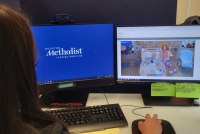Latest KFF Health News Stories
The national 911 emergency response system is in the midst of its own code red. The lack of federal funding to upgrade aging 911 systems has created significant disparities in state emergency response services, with older operations plagued by outages and longer response times. Last month, for instance, Massachusetts was hit with a statewide 911 […]
When Hospital Cyberattacks Compromise Care, Not Just Data
When hospitals are hit by cyberattacks that compromise crucial technology systems for managing patient care, the stakes are staggering. “We’ve started to think about these as public health issues and disasters on the scale of earthquakes or hurricanes,” said Jeff Tully, a co-director of the Center for Healthcare Cybersecurity at the University of California at […]
Fake Therapist Fooled Hundreds Online Until She Died, State Records Say
A Florida woman with no training in mental health services pretended to be a licensed social worker during online therapy sessions with Brightside Health patients.
Falsa terapeuta engañó a cientos de pacientes en Internet, y solo se supo porque murió
Cientos de estadounidenses pueden haber recibido terapia, sin saberlo, de una impostora sin formación que se hizo pasar por terapeuta en sesiones por internet, posiblemente durante dos años. El engaño sólo se descubrió cuando murió, según registros de departamentos de salud estatales.
Medicaid for Millions in America Hinges on Deloitte-Run Systems Plagued by Errors
The technology has generated notices with errors, sent Medicaid paperwork to the wrong addresses, and been frozen for hours at a time, according to state audits, court documents, and interviews. While it can take months to fix problems, America’s poorest residents pay the price.
Experts: US Hospitals Prone to Cyberattacks Like One That Hurt Patient Care at Ascension
Clinicians working for Ascension hospitals in multiple states described harrowing lapses, including delayed or lost lab results, medication errors, and an absence of routine safety checks to prevent potentially fatal mistakes.
¿Cómo Se Dice? California Loops In AI To Translate Health Care Information
State officials want to use artificial intelligence to translate public health care and social services documents and websites, which they say will speed up translations, save money, and improve Californians’ access to critical information. But some IT and language experts worry AI may introduce errors in wording and understanding.
¿Cómo se dice? California recurre a la IA para traducir información sobre atención médica
Funcionarios estatales quieren usar la inteligencia artificial para traducir documentos y sitios web de servicios sociales y de salud pública. Pero expertos en esta tecnología y en idiomas temen que la IA pueda cometer errores en la comprensión de los textos y en su redacción.
End of Pandemic Internet Subsidies Threatens a Health Care Lifeline for Rural America
As the Affordable Connectivity Program runs out of money, millions of people face a jump in internet costs or lost connections if federal lawmakers don’t pass a funding extension.
What the Health? From KFF Health News: Bird Flu Lands as the Next Public Health Challenge
Public health authorities are closely watching an unusual strain of bird flu that has infected dairy cows in nine states and at least one dairy worker. Meanwhile, another major health system suffered a cyberattack, and Congress is moving to extend the availability of telehealth services. Alice Miranda Ollstein of Politico, Sandhya Raman of CQ Roll Call, and Rachel Cohrs Zhang of Stat join KFF Health News’ Julie Rovner to discuss these issues and more. Also this week, Rovner interviews Atul Grover of the Association of American Medical Colleges about its recent analysis showing that graduating medical students are avoiding training in states with abortion bans and major restrictions.
Este delgado dispositivo, que funciona con baterías, se llama BioButton y registra los signos vitales de los pacientes, incluidas la temperatura, y las frecuencias cardíaca y respiratoria.
Forget Ringing the Button for the Nurse. Patients Now Stay Connected by Wearing One.
Dozens of hospitals have deployed a device that uses artificial intelligence to monitor patients remotely. One hospital says it reduces nurses’ workloads — but some nurses fear the technology could replace them.
Biden Team’s Tightrope: Reining In Rogue Obamacare Agents Without Slowing Enrollment
Federal regulators face a growing challenge — how to prevent rogue health insurance agents from switching unknowing consumers’ Obamacare coverage without making the enrollment process so cumbersome that enrollment declines.
Oh, Dear! Baby Gear! Why Are the Manuals So Unclear?
Sure, new parents are an anxious lot. But instruction manuals for devices meant to keep the baby safe and healthy are daunting and add to the anxiety. Why are they so confusing?
California Is Investing $500M in Therapy Apps for Youth. Advocates Fear It Won’t Pay Off.
California launched two teletherapy apps as part of the governor’s $500 million foray into health technology with private companies. But the rollout has been so slow that one company has yet to make its app available on Android, and social workers worry youths who need clinical care won’t get referrals.
What the Health? From KFF Health News: Abortion — Again — At the Supreme Court
For the second time in as many months, the Supreme Court heard arguments in an abortion case. This time, the justices are being asked to decide whether a federal law that requires emergency care in hospitals can trump Idaho’s near-total abortion ban. Meanwhile, the federal government, for the first time, will require minimum staffing standards for nursing homes. Alice Miranda Ollstein of Politico, Tami Luhby of CNN, and Joanne Kenen of Johns Hopkins University and Politico Magazine join KFF Health News’ Julie Rovner to discuss these stories and more. Plus, for “extra credit,” the panelists suggest health policy stories they read this week they think you should read, too.
FTC Chief Says Tech Advancements Risk Health Care Price Fixing
Technological advances including the widespread use of algorithms make it easier for companies to fix prices without explicitly coordinating, Lina Khan said at a KFF event.
Medical Providers Still Grappling With UnitedHealth Cyberattack: ‘More Devastating Than Covid’
Medical providers say they’re still coping with the Change Healthcare cyberattack disclosed in February even though parent company UnitedHealth Group reported that much is back to normal and its revenue is up over last year.
What the Health? From KFF Health News: Too Big To Fail? Now It’s ‘Too Big To Hack’
Congress this week had the chance to formally air grievances over the cascading consequences of the Change Healthcare cyberattack, and lawmakers from both major parties agreed on one culprit: consolidation in health care. Plus, about a year after states began stripping people from their Medicaid rolls, a new survey shows nearly a quarter of adults who were disenrolled are now uninsured. Jessie Hellmann of CQ Roll Call, Sarah Karlin-Smith of the Pink Sheet, and Lauren Weber of The Washington Post join KFF Health News’ Mary Agnes Carey to discuss these stories and more. Also this week, KFF Health News’ Julie Rovner interviews Caroline Pearson of the Peterson Health Technology Institute.
Congress Likely to Kick the Can on Covid-Era Telehealth Policies
With an end-of-year deadline and a presidential election approaching, payment rules that fueled rapid expansion of telehealth in the United States face a last-minute congressional decision.





















